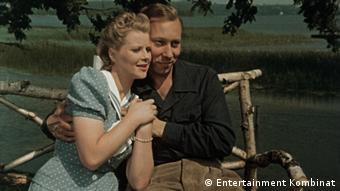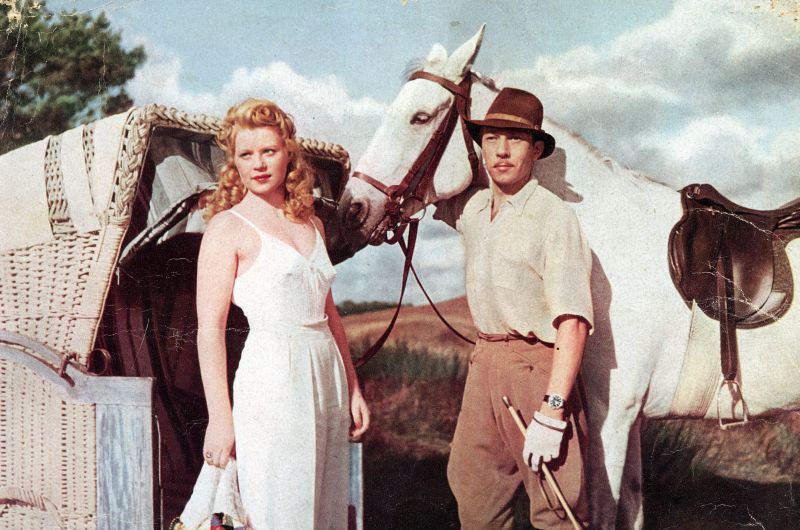« Thunderbolt | Main | Return to the Cinema Chamber »
July 27, 2021
Two Films by Veit Harlan

Immensee (1943)

The Great Sacrifice/Opfergang (1944)
Kino Classics BD Region A
Even if the opportunity came about, I do not think I could bring myself to watch Jud Suss. I have seen excerpts. With this newly available blu-ray, the curious can have a glimpse at Harlan's work beyond the one film that made, and unmade, his reputation. Not that these two films are apolitical. One does not have to dig deep for the nationalism and other examples of cultural blinders that are considered assets here. Veit Harlan was Germany's top film director during World War II not only due to his willingness to make Jud Suss, but because also because virtually everyone else of equal or greater talent had emigrated to Hollywood. Whatever Germanic virtues are being extolled in Harlan's melodramas is undermined by the blandness of the films and their leading characters in Immensee and the delirious melodrama of The Great Sacrifice.
Both films star Harlan's wife, the Swedish born Kristina Soderbaum. The actress reportedly epitomized Aryan beauty with her wholesome appearance. In Immensee, Soderbaum plays the part of a small town girl, Elisabeth, caught between an up and coming composer-conductor, Reinhardt, and a wealthy young suitor, Erich. After pledging fidelity to each other, Reinhardt leaves town for a three year scholarship. A surprise visit by Elisabeth reveals that even neoclassical composers have their share of groupies when a woman is discovered in Reinhardt's bed. Elisabeth goes back home to marry Erich. Reinhardt graduates and goes off to Rome. While one might be sympathetic to Reinhardt's protests that the opera singer he is having an affair with has rewritten his lyrics, Italian actress Germana Paolieri proves to be the more charismatic actress in her small role. Reinhardt also shows his provincialism by preferring German food over Italian cuisine. Elisabeth is the ideal German woman, proud of being "rooted" in her small town, faithful to her husband even as a widow. Reinhardt is allowed to be a cad because he believes in Bach and Beethoven. The film tries to play it both ways with Elisabeth comparing Reinhardt's nomadic existence to that of "gypsies", and then claiming she's only quoting her mother. I do not know how innocent that line was for its intended audience at the time, although history has made it a chilling remark.
Political considerations are dispensed with early in The Great Sacrifice. Nautical explorer Albrecht tells of his successful travels, port by port, from Hamburg to Japan, noting that he has overcome a euphemistic "disruption". Albrecht is played by Carl Raddatz, Reinhardt from Immensee, this time as the one caught in a triangle between two women. Albrecht gets engaged, and marries Octavia, a high class woman from a family that enjoys discussing the Dionysian poetry of Nietzsche on a Sunday morning. The family is so intellectual and reserved that Albrecht has to literally drag Octavia into participating in a very Dionysian celebration. Albrecht gets distracted by Als, a mysterious neighbor who introduces herself by swimming nude by Albrecht's row boat. As beautiful as Octavia is, Als impresses Albrecht by being an accomplished equestrian and archer, as well as combining the two as an Aryan version of the mythological Diana, shooting arrows while riding her horse, straight into the targets. Kristina Soderbaum appears as the fatalistic Als, who has romantic notions about death. Irene von Meyendorff, another favorite actress of the time who also bears some resemblance to Carole Lombard, plays Octavia.
The Great Sacrifice does not have the reputation, either good or bad, as Immensee, but it is the better film. The scene of the annual celebration, with its elaborate set featuring a giant slide, and what may be a hundred or so partying extras in costume is eye catching. Filming in color, even in the subdued Agfacolor process, pays off here. There is also Als dreams or hallucinations about Albrecht while deathly ill. This is one of those films where being over the top is an asset, albeit perhaps not intentionally. The film reportedly had a limited release due the availability of color film stock. Well before The Great Sacrifice ended, I wondered if R. W. Fassbinder had seen it, and if so, thought about making his own version. The one person who notably has seen and admired The Great Sacrifice is philosopher Slavoj Zizek who wrote about the film in his essay, "Hallucination as Ideology in Cinema".
Both films have commentary tracks. German film critic Olaf Moller discusses how the combination of star Soderbaum and director Harlan was commercially beneficial for both. Cultural context is provided in how Germans viewed and mythologized "the North", which in part explains why German films of the time featured characters as well as stars from Scandinavian countries. On a more personal level, Moller points to one of the scenes shot on location where his grandmother may have been an extra. The Australian tag team of Alexandra Heller-NIcholas and Josh Nelson cover The Great Sacrifice. Using a variety of scholarly sources, Harlan's career is discussed. While most serious cineastes will identify connections in the use of melodrama between Harlan, Fassbinder and Douglas Sirk, it suggests that more research, as well as availability, might be needed before making conclusions about German melodrama during the Nazi era. Heller-Nicholas also mentions Stanley Kubrick's fascination with Harlan, and Harlan's possible influence on Kubrick's films. (Kubrick's wife was the niece of Veit Harlan.) Both films were sourced from 4K scans from Murnau Foundation. There was some damage in a brief transitional scene in The Great Sacrifice. As it stands, the historical importance of this blu-ray release can not be underestimated.
Posted by Peter Nellhaus at July 27, 2021 05:23 AM
